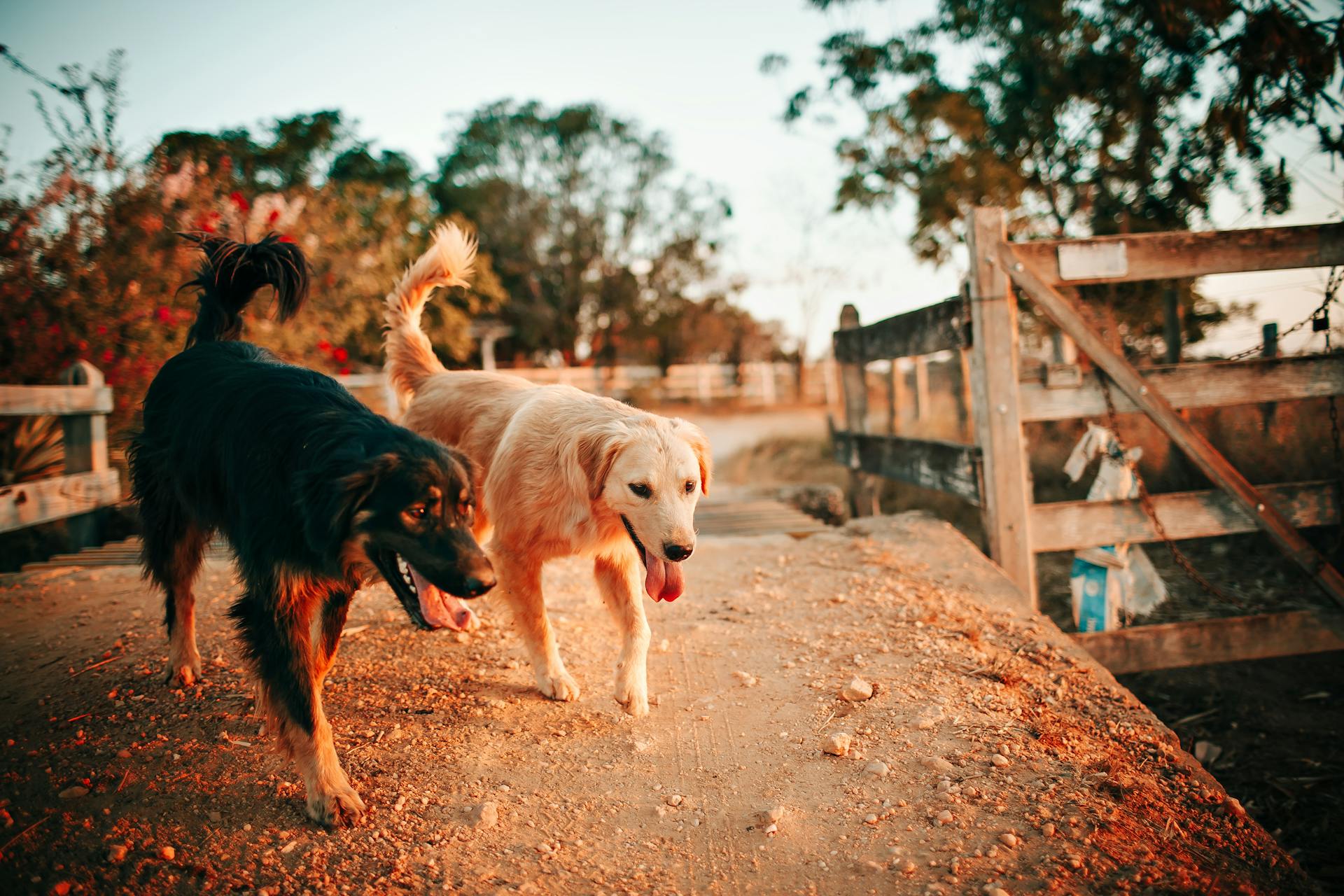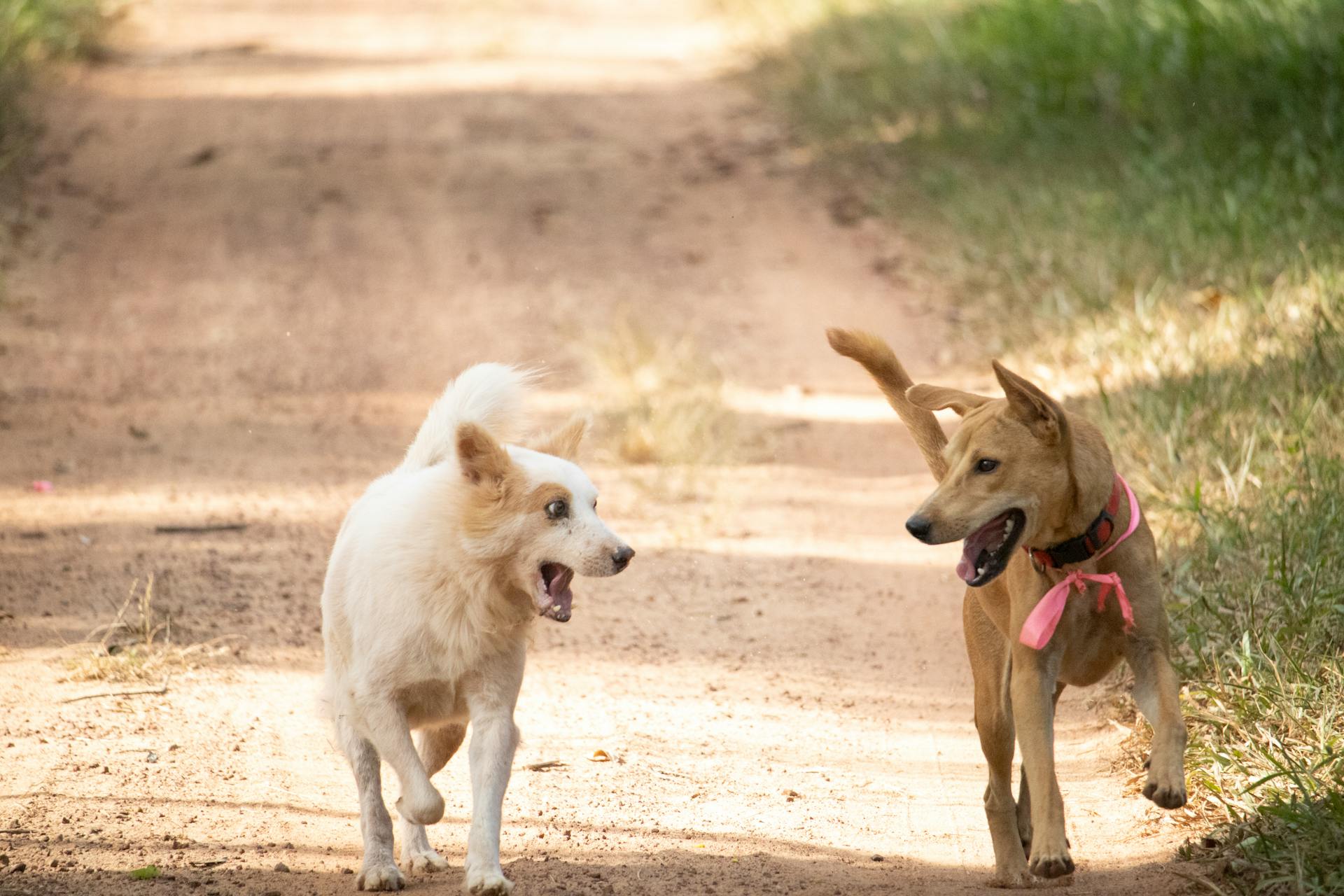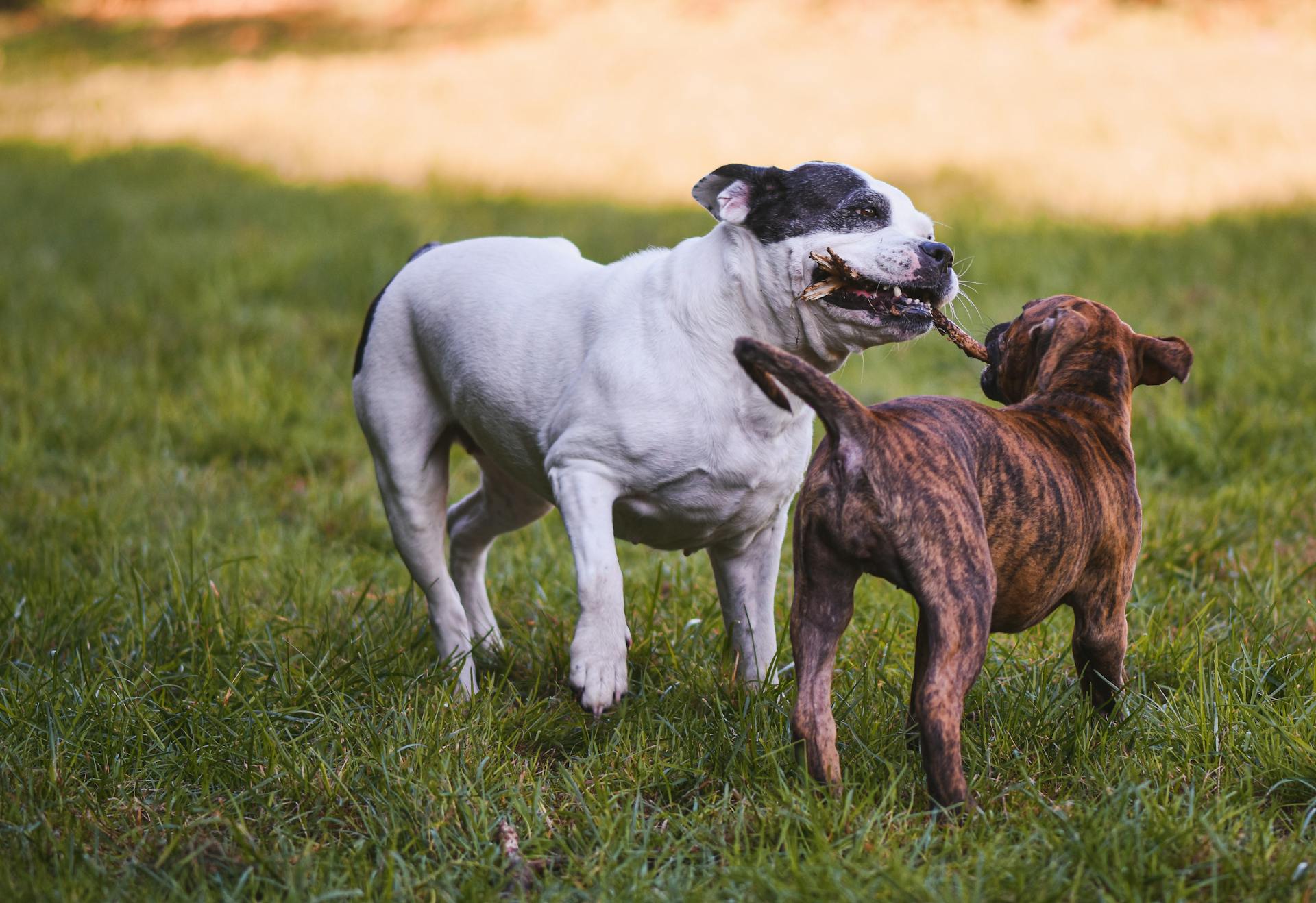
Dogs not drinking water can be a concerning issue for pet owners. If your dog is not drinking water, it's essential to take action immediately to prevent dehydration and potential health problems.
A dog's water intake is crucial for their overall health, and a lack of water can lead to serious issues like kidney stones, urinary tract infections, and even kidney failure. Dehydration can also cause a range of symptoms, including dark urine, dry mouth, and decreased urine output.
If your dog is not drinking water, it's likely due to a medical issue, such as kidney disease or gastrointestinal problems, or it could be a result of changes in their environment, like a move to a new home.
Why Dogs Don't Drink Water
Your dog's refusal to drink water can be a cause for concern, especially if it's a sudden change in behavior.
There are several reasons why your dog may not be drinking water, and it's essential to identify the cause to ensure their health and well-being.
If you're suddenly finding your dog won't drink water, there are a couple of reasons why: their bowl might be too deep, making it difficult for them to access the water easily, or the water might be too cold, causing them to prefer warmer water.
Your dog may be drinking less water than their body requires due to a medical condition, such as kidney disease or diabetes, which can affect their thirst and water intake.
A handful of the most common reasons why a dog will refuse to drink water include a dirty or unappealing water bowl, a change in their environment or routine, or even a dental issue that's causing them pain when drinking.
If your dog is not drinking water, it's crucial to consult with a veterinarian to rule out any underlying health issues that may require medical attention.
Encouraging Water Intake
Encouraging your dog to drink more water can be a challenge, but there are some simple strategies you can try. Changing their water source can make a big difference, as some dogs prefer drinking from a specific bowl or a running water source.
Offering ice cubes is another great way to encourage your dog to drink more water. Many dogs enjoy chewing on ice cubes, which can help to stimulate their thirst.
Some dogs may also appreciate a little flavor in their water, such as a small amount of chicken broth or apple juice. You can try adding a bit of flavor to their water to see if it makes a difference.
Here are some strategies you can try:
- Change their water source to a specific bowl or a running water source
- Add flavor to their water with a small amount of chicken broth or apple juice
- Offer ice cubes to stimulate their thirst
Health Risks and Symptoms
Dogs that don't drink enough water can suffer from dehydration, which can lead to serious health risks. Dehydration can cause a dog's skin to lose its elasticity, making it harder to pinch and take longer to return to its normal shape.
A 50-pound dog should drink about 50 ounces of water daily, but this can vary depending on their size, age, activity level, and overall health. Dogs that are more active or live in hot climates may need to drink more water to stay hydrated.
If your dog is dehydrated, they may exhibit symptoms such as loss of appetite, vomiting, reduced energy levels, and panting. You can test for dehydration by gently pinching your dog's skin near their shoulder blades and checking how quickly it returns to its normal shape.
Here are some common symptoms of dehydration in dogs:
- Loss of skin elasticity
- Loss of appetite
- Vomiting (with or without diarrhea)
- Reduced energy levels and lethargy
- Panting
- Sunken, dry-looking eyes
- Dry nose
- Dry, sticky gums
- Thick saliva
If you notice any of these symptoms in your dog, it's essential to seek help from a veterinarian as soon as possible.
Causes and Prevention
Dehydration in dogs can happen for several reasons, including changes in diet, medications, or dental problems. It's essential to monitor your dog's water intake to ensure they receive an adequate amount of fluids based on their weight and activity level.
Some common sources of fluid loss include overheating due to hot weather, vomiting, or diarrhea. Dogs may also stop drinking water due to medical conditions such as kidney disease, diabetes, or Cushing's disease.
To prevent dehydration in dogs, it's crucial to provide them with a constant supply of clean, clear water at all times. A general rule of thumb is to provide at least one ounce of water per day for each pound of body weight. You can also encourage your dog to drink by flavoring water with bone broth or giving them ice cubes to chew on.
Here are some key factors to consider when preventing dehydration in dogs:
Causes
Dehydration in dogs can occur due to various reasons. Some dogs may not drink enough water due to changes in diet, medications, or dental problems. This can lead to a decrease in the amount of water being consumed, causing dehydration.
A dog's body releases heat slower than a human's, making them more susceptible to overheating. This can cause an increase in fluid loss, leading to dehydration. Common sources of fluid loss include overheating due to hot weather, vomiting, or diarrhea.

Dogs may also become dehydrated due to medical conditions such as kidney disease, diabetes, and Cushing's disease. These conditions can affect a dog's water consumption, leading to dehydration.
Environmental factors such as a change in the water source or the introduction of a new pet can also cause a dog to become hesitant or refuse to drink water. This can be due to a negative experience associated with the water bowl or drinking water.
Here are some common causes of dehydration in dogs:
- Not drinking enough water due to changes in diet, medications, or dental problems
- Increased water loss due to excessive panting or vomiting
- Medical conditions such as kidney disease, diabetes, and Cushing's disease
- Environmental factors such as a change in the water source or the introduction of a new pet
It's essential to take your dog to the vet as soon as possible if you suspect they are dehydrated. The vet will be able to examine your dog and run any necessary tests to determine the cause of the dehydration.
How Much Does a Need Cost?
As you're considering the costs associated with your furry friend, you might wonder how much a dog's water needs can impact your expenses. A dog's water needs can be calculated based on its body weight, with a general rule of thumb being 100 ml of water per kilogram of body weight per day.

However, other factors come into play, such as the dog's size, activity level, and the type of food it's being fed. For example, a larger dog with a high activity level may require more water to stay hydrated.
To give you a better idea, here's a rough estimate of the costs associated with providing your dog with enough water:
Keep in mind that these are just rough estimates, and your dog's individual needs may vary depending on its specific circumstances.
Veterinary Help and Treatment
If your dog still isn't drinking enough water after trying different strategies, it's essential to seek help from a veterinarian. They can determine if there's an underlying medical condition causing your dog's lack of water consumption and provide the appropriate treatment.
A veterinarian will be able to assess your dog's dehydration symptoms, such as sunken eyes, dry gums, or lethargy, and provide the correct treatment. If your dog has any of these symptoms, persistent vomiting, or you suspect heatstroke, take him to the vet immediately.
Your veterinarian will likely administer fluids intravenously or subcutaneously to treat the dehydration itself. This can help replace the fluids that were lost and prevent further loss.
To determine the underlying cause of the dehydration, your veterinarian may need to run additional testing, such as blood work or X-rays. This will help confirm a diagnosis and rule out other potential causes.
Your veterinarian may recommend giving your dog an electrolyte-enhanced fluid like Pedialyte to help replace lost electrolytes. However, it's best to check with your veterinarian for dosage recommendations.
If your dog is vomiting, it's crucial to seek veterinary help right away. Your veterinarian can administer subcutaneous or intravenous fluids to most quickly replace the fluids that were lost and prevent further loss.
Frequently Asked Questions
How long can a dog go without drinking water?
A dog can typically survive without water for about 72 hours, but may show signs of dehydration after 24 hours. However, every dog is different and various factors can affect this time frame.
Why would a dog not like water?
Dogs may not like water due to unfamiliarity, discomfort, or past traumatic experiences. Understanding the root cause is key to helping your pet feel more at ease around water.
What to do if a dog is dehydrated?
Offer your dog small amounts of water or ice to lick, and consider using Ringer's lactate to restore electrolyte balance
Sources
- https://happytailservet.com/blog/dog-wont-drink-water/
- https://www.akc.org/expert-advice/health/warning-signs-dehydration-dogs/
- https://tractive.com/blog/en/good-to-know/my-dog-wont-drink-water
- https://canna-pet.com/articles/help-my-dog-wont-drink-water-canna-pet/
- https://www.altaspalmas.com/site/blog/2022/04/15/dog-go-without-water
Featured Images: pexels.com


